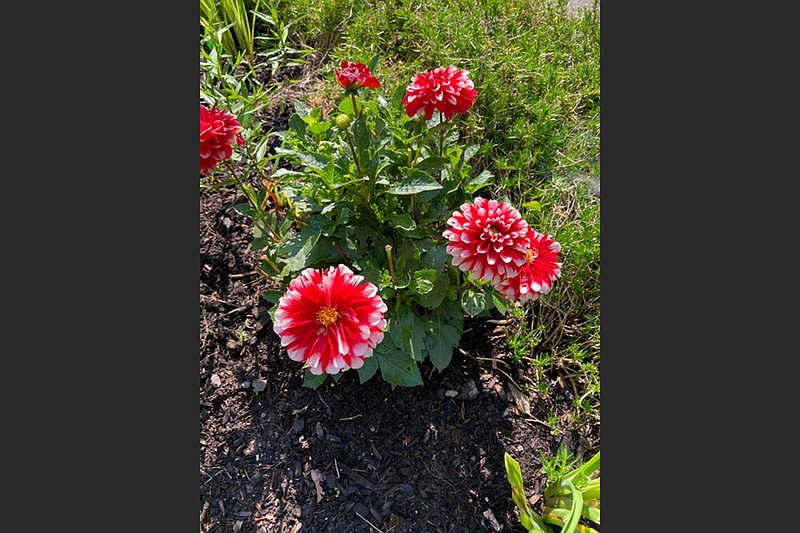In the garden
Dahlia found in Maine may have trouble in Arkansas
Q: We found these beautiful flowers in Maine this summer; can you identify them for us? [The reader sent a photo.]
A: The plant in question is a dahlia. They will grow in Arkansas but not as easily as they grow in places with cooler summers. I think the whole world went to Maine in the past month or two. I can't tell you how many people I know who have been there this summer/fall or are going. Who knew! I saw the same variety at a botanical garden when I was there a few weeks ago.
County extension office can identify plant disease
Q: Any ideas as to why some of my azaleas are dying? Our yard was landscaped last fall. I applied fertilizer in the spring. From the photo you can see a sprinkler head, so they are getting adequate water. Any ideas?
A: I assume from the health of nearby plants that the water from that sprinkler head is adequately watering the area. We do need to test our sprinkler systems from time to time to make sure everything is working properly, but as close to the head as that plant is, I don't think water has been the problem. I also don't think this plant is salvageable. To properly identify what happened, take some good samples -- stems, roots and leaves -- to your local county extension office. Your photograph would be a good accompaniment. They can send it to the disease diagnostic lab for analysis. When you pull the plant up, look at the root system. Was it full and healthy looking, or stunted or rotted? Look at the crown of the plant where it goes into the ground, and the main branches to see if there is any bark splitting or unusual growth. The disease diagnostic lab can give you a definitive answer so, hopefully, you can prevent future trouble.
Elephant ears will likely hold on through winter in large containers
Q: Will these elephant ear plants survive the winter in these containers? [The reader sent a photo.]
A: The containers you have are fairly large, and it looks like you have the common variety of elephant ears, which is the most hardy. If you live in Central Arkansas or southern Arkansas, I think you will be fine. It also depends on how cold it gets this winter. Add a layer of mulch to the pots after they die back and, hopefully, they will come through fine. Raised beds and containers do allow the soil to get colder than soil in the ground, and if the soil freezes it could damage the bulbs. In most winters, that is not going to happen in Arkansas, but never say never.
El Dorado Master Gardener seeks advice for flower tourism
Q: I am a Master Gardener in El Dorado and an avid fan of yours. In mid-October my husband and I will fly into Amsterdam and stay there two nights before boarding a Holland America ship for a transatlantic cruise. I've read that it is possible to observe the flower/bulb auction that is located near the airport. I am wondering if travelers can buy bulbs (or other plants) while there. Do you have tips/advice for travelers like me?
A: I was fortunate to take a group of gardeners to Amsterdam several years ago. We did book a group tour to see the Royal FloraHolland flower auction -- an amazing sight, to be sure. We had to leave early -- 6 a.m. to arrive at 7 for the opening. You want to get there early to see the most action. If you are going a day early for your cruise, you could book a visit. Here is a shortcut link to the website: arkansasonline.com/102bulbs. During the tour, they take you behind the scenes where you can see into the room where customers are buying flowers in huge lots. Then you see all these forklifts moving crates of flowers. It looks like an anthill of people and flowers. Pretty impressive. You don't go up close and personal with the flowers, nor can you buy any, but it is quite interesting. I think we all enjoyed it.
Retired after 38 years with the University of Arkansas Cooperative Extension Service, Janet Carson ranks among Arkansas' best known horticulture experts. Her blog is at arkansasonline.com/planitjanet. Write to her at P.O. Box 2221, Little Rock, AR 72203 or email [email protected].




